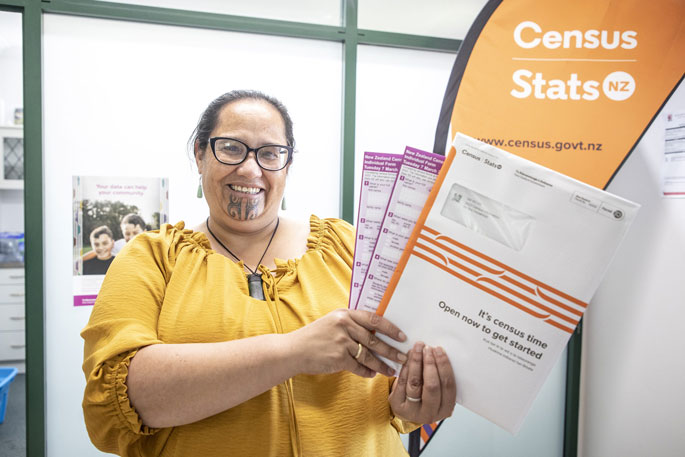Rotorua's homeless community will be the focus of several census engagement events over the next month.
The New Zealand Census of Population and Dwellings is the official count of the people and dwellings in New Zealand.
The 2018 census was criticised for its poor participation, and as such there was poorer data quality for some aspects.
This year, the census will be held on March 7, but became live on February 13.
Te Arawa Lakes Trust chief executive Karen Vercoe previously shared how the outcome of the last census was a 'setback” for Māori data, and impacted on things such as funding Te Aka Whai Ora, The Māori Health Authority.
Census data is used in many ways, including for developing and implementing policies and planning, as well as decisions on services such as healthcare, education, housing and transport.
In the next few weeks, several events will be held to engage with Rotorua's transient and homeless whānau in emergency accommodation.
More community engagement was a direct result of the last census and aimed at improving participation.
Rangimarie Bidois is the Stats NZ Census 2023 area manager for Rotorua, Matamata, Tokoroa and Morrinsville and says this year's census aims to be the most inclusive yet.
'This means making sure everyone in Aotearoa New Zealand is counted, no matter where they live or stay.”
It's therefore running the events to support residents in social, emergency and transitional housing to ensure they were counted, she says.
'To do this, we have developed a relationship with Te Hau Ki Te Kāinga based at Te Pokapu (Rotorua Housing Collective) and are working with several service providers across Rotorua."
Its approach is to work with the people in the community who already hold trusted relationships with the people it wants to support, she says.
'It is crucial that our whānau in this demographic are counted – they are members of our community, and it is vital they are supported. Tatau tātou – All of us count.”
With the last census resulting in poor data for some variables, she says this is why this year's census and these events are 'vital” for getting data that supported all communities.
Asked how emergency housing residents are impacted by the things the census data informed, she says iwi, community groups, local and central government and businesses use it to make decisions about funding and providing services. This includes housing.
'When everyone in Rotorua is counted, they will be represented in the data about our community.
'That means that decisions can be made about services for our community that meets the needs of our people.”
She asks people to take care of the census collectors, who are whānau and community members.
Visions of a Helping Hand Charitable Trust is among the providers participating in the event.
Chief executive Tiny Deane says it first worked with census staff in November last year through the Te Hau ki Te Kāinga collective, with the intent to build client engagement.
The planned activities and events aim to motivate whānau to complete census forms.
He says whānau can be supported by data collectors to complete these and Visions will host and support Assisted Collection Events, creating a 'supportive and fun” environment.
Deane says Contracted Emergency Housing providers are part of the census priority group, so that long-term support can be provided to those suffering housing deprivation by making their data visible to Government agencies.
He says it plans for census staff to go to one of its contracted housing sites on February 21.
All clients are welcome to attend and census staff will be putting on a barbecue while informing and increasing understanding of the purpose and importance of the census to clients.
'We have a dedicated contact person within census staff and are discussing with them the possibility of replicating this event at other Visions CEH sites to engage more whānau.”
Rotorua Mayor Tania Tapsell says participating in the census helps provide a clearer picture of what Rotorua families and communities need.
'Ensuring that we have the best up-to-date information is key so that we can plan well for now and the future.”
She says for organisations such as councils, the information collected can help them understand the current situation of the community so they can make better decisions that deliver positive social and economic outcomes.
Census collectors will be out in the community soon to support people to do it. While census day is March 7, it can be completed as soon as you receive a form.
It can be completed either online or on paper.
Te Aka Whai Ora did not respond by deadline.
- Public Interest Journalism funded through NZ on Air.




2 comments
Interesting
Posted on 18-02-2023 13:12 | By Kancho
So wonder if there will be an improvement in participation with lots of extra cash thrown at it . Think the figure is two hundred and fifty million dollars to run the census. $250,000, 000 and a population around five million of whom many will be children and on household forms only . So the actual number of people filling out the census is a lot less and add people who avoid or refuse the per head cost is wow. I suppose they will have to just take a stab at it as a guess but like last time.
Homeless?
Posted on 18-02-2023 22:35 | By Bob Landy
Hahahaha. They’re all in accomodation bought by Jacinda and paid for by the taxpayer.
Leave a Comment
You must be logged in to make a comment.